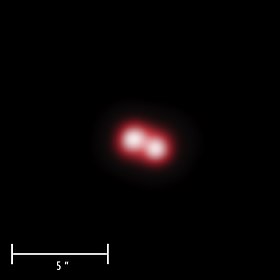RX J0822−4300, often referred to as a "Cosmic Cannonball", is a radio-quiet neutron star currently moving away from the center of the Puppis A supernova remnant at 672±115 km/s, making it one of the fastest moving stars ever found.[3] Earlier, it was believed to move with speed as high as 1,500 km/s. Astronomers used NASA's Chandra X-ray Observatory to observe the star over a period of 11 years to determine its speed.[3]
| Observation data Epoch 1952 (equinox J2000.0)[1] Equinox 1952 (equinox J2000.0)[1] | |
|---|---|
| Constellation | Puppis |
| Right ascension | 08h 23m 8.16s[2] |
| Declination | −42° 41′ 41.4″[2] |
| Apparent magnitude (V) | ~24[2] |
| Astrometry | |
| Radial velocity (Rv) | 672 km/s |
| Distance | 2,000 pc |
| Galactic coordinates | 260.3841 −03.4718 |
| Other designations | |
| Database references | |
| SIMBAD | data |
Although the cosmic cannonball is not the only hypervelocity star discovered, it is unique in the apparent origin of its speed. Others may have derived theirs from a gravitational slingshot around the Milky Way's suspected supermassive black hole, Sagittarius A*. Current theories fail to explain how such speeds can be attained from a supernova explosion. It could be a possible quark star.
See also
edit- Puppis A or SNR 260.4−3.4
References
edit- ^ Hui, C. Y.; Becker, W. (2006). "Probing the proper motion of the central compact object in Puppis-A with the Chandra high resolution camera". Astronomy and Astrophysics. 457 (3): L33. arXiv:astro-ph/0606750. Bibcode:2006A&A...457L..33H. doi:10.1051/0004-6361:20065941. S2CID 14468740.
- ^ a b c Hui, C. Y.; Becker, W. (2006). "X-ray observations of RX J0822−4300 and Puppis-A" (PDF). Astronomy and Astrophysics. 454 (2): 543. arXiv:astro-ph/0508655. Bibcode:2006A&A...454..543H. doi:10.1051/0004-6361:20053554. S2CID 14739530.
- ^ a b Becker, Werner; Prinz, Tobias; Frank Winkler, P.; Petre, Robert (2012). "The Proper Motion of the Central Compact Object Rx J0822–4300 in the Supernova Remnant Puppis A". The Astrophysical Journal. 755 (2): 141. arXiv:1204.3510. doi:10.1088/0004-637X/755/2/141. S2CID 250810663.
- "Cosmic Canonball: One Of The Fastest Stars Ever Seen Challenges Astronomy Theories", ScienceDaily, (2007)
- "Chandra Discovers a Cosmic Cannonball", Science@NASA (10.28.2007)
- Chandra X-Ray Observatory, "RX J0822-4300 in Puppis A: Chandra Discovers Cosmic Cannonball", 2007 November 28
- https://web.archive.org/web/20071205023347/http://www.unesp.br/universofisico/semanario.php?date=2006-08-14
- "RX J0822−4300". SIMBAD. Centre de données astronomiques de Strasbourg.
